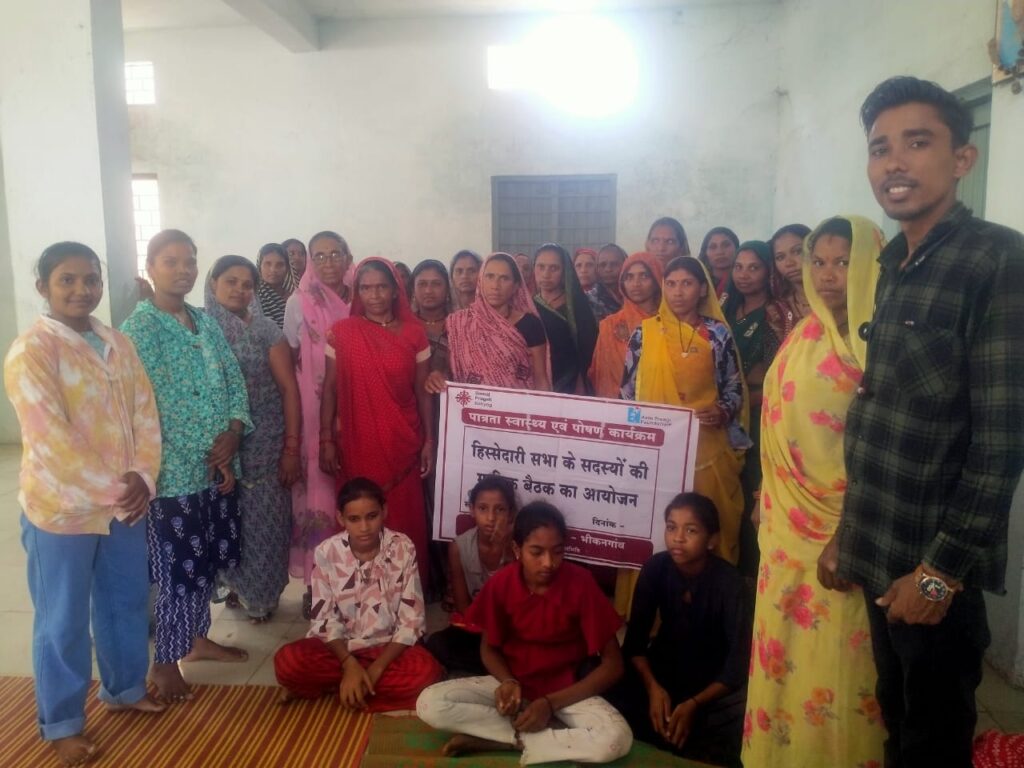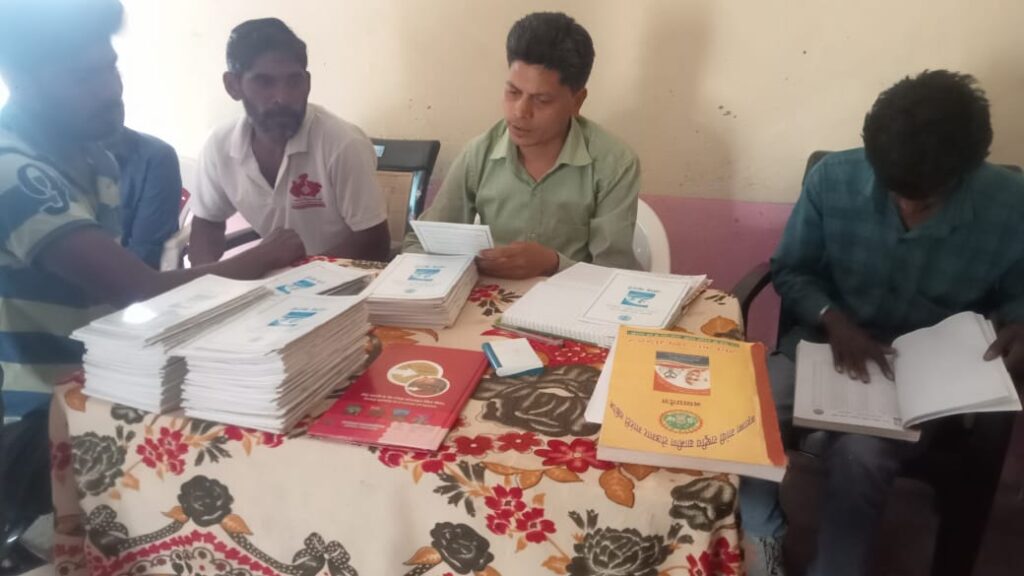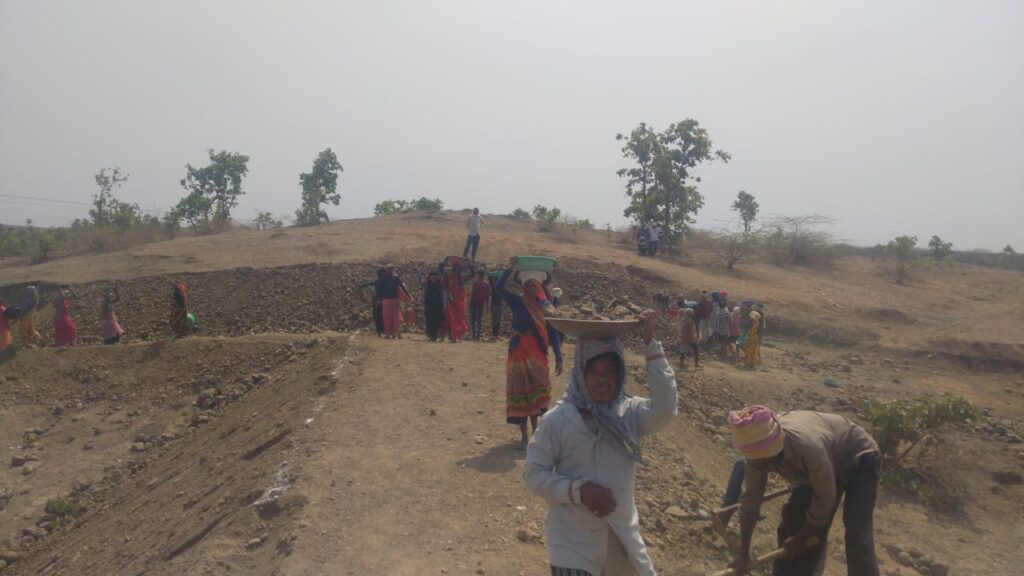The women of Chikalwas village, which comes under the Palasi Panchayat of Khargone district, had long been demanding that the Panchayat give them wage work. Most people here are either marginalised farmers or landless farm labourers, and both depend on daily wage labour for their very survival. The women had appealed several times to the Sarpanch (village head) and the Rojgar Sahayak[1] , reminding them of how, because they could obtain only seasonal work, they were forced to migrate in search of work to Khandwa or Indore, or even further to towns in the neighbouring stateof Gujarat. The Panchayat must give them work in lean periods. Each time, however, they gota standard reply: the Panchayat could do nothing, as it was not receiving any work commissions from higher officials.

Hissedari Sabha
Then by sheer chance some women learned that the Panchayat had a job order for digging a pond, under the MNREGA (Mahatma Gandhi Rural Employment Guarantee Act) scheme. However, the Sarpanch was having the digging done by machines, under cover of night. Around this time, the Hissedari Sabha[2] held its monthly meeting, at which the women from Chikalwas village aired their grievances, asking how they were expected to survive if work meant for manual labourers was going to be done by machines, despite villagers being guaranteed employment under MGNREGA.How could they run their homes? The Hissedari Sabha leaders resolved to take up the issue with the Sarpanch that very day.

Hissedari Sabha
The Chikalwas women accompanied the Hissedari Sabha leaders to the Panchayat office, where they spoke about the problem, emphasising that the villagers were in urgent need of work, and so it was imperative they be employed to dig the pond, instead of machines being used for the purpose. Even now, the Sarpanch refused to budge.
When the women recounted the entire situation to Mohan Parihar of the Health and Nutrition Programme, he asked them about the status of their job cards. It turned out that their cards had been lying with the Sarpanch for three years, and he had been holding on to them despite the women repeatedly asking to have them back. Possession of a job card is essential, as it gives registered households the legal right to apply for employment, besides ensuring that the entire process remains transparent, and shielding the labourer from being cheated. Mohan explained that if an applicant does not receive paid work within 15 days, she becomes entitled to an unemployment allowance. He advised the women to visit the Panchayat office again and demand their job cards back.

Panchayat Office
At the office, the women informed the Sarpanch that they would not leave the place without their job cards in hand. After much argument back and forth, the Sarpanch had to give in. Armed with their cards, the woman reminded the Sarpanch that under MNREGA there was no provision for substituting manual labour with machines, and to do so was a violation of the Act.[1] . If the Sarpanch still refused to comply, they said, they would take their complaint against him to the larger, Bhikangaon Janpad Panchayat, or DistrictCouncil. At last, the Sarpanch grew fearful of the consequences, and promised that all the work would be assigned to the villagers – all who wanted work digging the pond should be present the next morning. No machines would be used at the site henceforth.

Working in the farm pond under MGNREGA scheme
MGNREGA is founded on the concept of manual labour. Its aim is to guarantee employment to persons in rural areas. Unemployed villagers are meant to be the main beneficiaries of construction works, so that they are assured of livelihood. Through the combined efforts of the Chikalwas Hissedari Sabha leaders and other women from the village, 55 labourers received daily wages at the fixed rate of Rs 243 per day for work lasting around 35 days. The pond was being constructed on Forest Department land for storingrain water.

[1] Assistant Employment Officer, whose duties relate to handling various aspects of employment offered under government schemes
[2] meetings organised by members of the Self Help Group (SHG) to discuss various issues of concern for their villages – such as access to drinking water, PDS shops, toilets, pension schemes, PM Awas Yojana, etc.
[3] Under MGNREGA, it is against the Act to use machines for performing work that labourers are capable of doing. The Act forbids the use of machines that displace manual labour. However, an exception is made for activities which cannot be carried out manually, and depend on the use of machines.
Writing: Roshni Chouhan
Source: Sakshi Kushwah
Phtography: Sakshi Kushwah and Banti Meena
